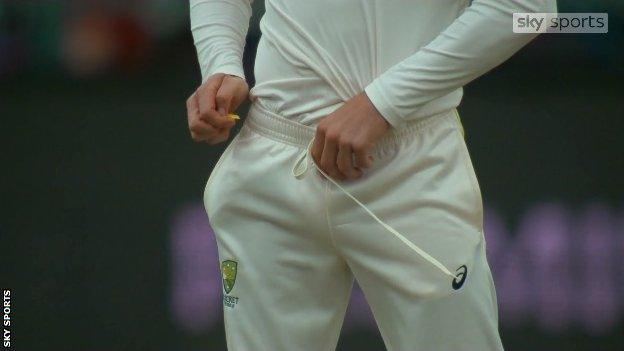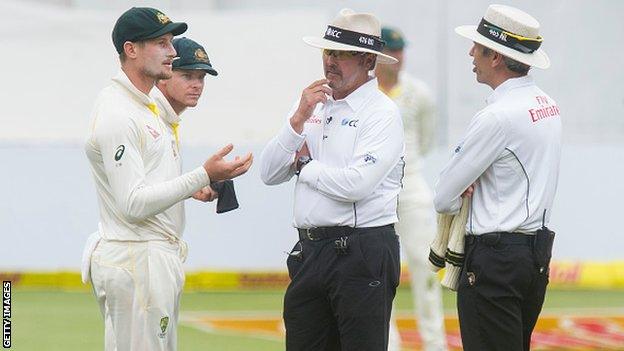Australia ball-tampering row: The key questions facing Australian cricket
- Published
Watch: Bancroft and Smith admit ball-tampering plan
Australian cricket is mired in the biggest scandal to hit the Test game since three Pakistan players were caught spot-fixing at Lord's in 2010.
The pictures from the third day of the third Test against South Africa of Cameron Bancroft rubbing what we were later told was yellow tape against the ball and then hiding it down the front of his trousers were only outdone on the scale of extraordinary by the news conference that followed.
Bancroft and then captain Steve Smith came clean. It was a premeditated and calculated plan to alter the condition of the ball.
There is a debate to be had on the severity of ball-tampering as a cricketing crime. It is nothing new for bowlers and fielders to attempt to conjure something from the leather by fair means or foul.
That, though, is for another day. Right now, the ferocity of the backlash against Smith, his team and its management has left a number of Australian cricketing giants fighting for their jobs and the governing body of the sport down under wondering how to repair its shattered reputation.

TV cameras caught the moment Bancroft took what he said was yellow tape out of his pocket
Who was involved in the ball-tampering plot?
From what has happened so far, we know Smith, vice-captain David Warner and Bancroft are conspirators. But how many other players are in the "leadership group" referred to by Smith? Was substitute fielder Peter Handscomb, seen on a walkie-talkie and then passing a message to Bancroft, also in on the plot?
There are also questions around coach Darren Lehmann. Smith said only players were involved, but is that to be believed? If not, and Lehmann genuinely didn't know, why not? Is it worse to be in on the plan, or to be so out of control that you are unaware your team is about to do something so brazenly stupid, damaging and beyond the laws of the game? His future is also on the line.
Former Australia fast bowler Jason Gillespie told Sky Sports: "Until we've heard from Lehmann, we won't know any more. He hasn't fronted the media yet - everyone is waiting for that.
"It's hard to think there isn't going to be a fall-out and a big change in personnel. It appears there's going to be some big changes on and off the field.
"The Australia side has to have a deep reflection on how they go about the game, how they're perceived in the wider cricketing world. That perception isn't good, that's the brutal reality."
In the short term, Australia need a captain for the fourth and final Test following the one-match ban handed to Smith by the International Cricket Council.
It seems unlikely that can be Warner who, like Smith, was removed from his role for the rest of the third Test by Cricket Australia for being part of the "leadership group" that cooked up the plan.
If there are further bans to be dished out by CA, how would that affect the match in Johannesburg, which is due to begin on Friday? Might the majority of a new squad have to be scrambled to South Africa?
After that, there are decisions to be made on the long-term futures of Smith, Warner and any other players or coaches involved.
Should their immediate admission be admired, or was it naive?
Smith and Bancroft have form as a news-conference double act. It was the same pair who lampooned Jonny Bairstow's 'headbutt' after the first Ashes Test in Brisbane.
What really happened between Bancroft & Bairstow?
It is quite an effort to pull off a second memorable performance, but this time for quite different reasons.
On the one hand, it can be said they should be applauded for facing the music right away. They came clean, rather than choosing to hide. They admitted what they did was wrong and promised it would never happen again.
But did they have much choice? The evidence against Bancroft was overwhelming, played and replayed not only on TV, but on big screens inside the ground, causing him to "panic", in his own words.
Once Bancroft was in the dock, it was only right Smith joined him. It would have been grossly unfair to ask a team-mate or coach to explain what happened on their behalf.
Both men said the attempt to alter the ball did not work because the umpires did not opt to change it. If that was offered as a defence, Smith followed up by saying Australia had made a "poor choice".
In amongst the contrition came the most pertinent question - were they sorry they had cheated, or sorry they had been caught?
"If we weren't caught, I'd still feel incredibly bad about it," said Smith, who also insisted it had never happened before.
When that was put to Stuart Broad, the England pace bowler said he had seen no evidence of ball-tampering during the Ashes. He did wonder, though, why Australia, with such a talented pace attack, would need to move from the method that defeated his team 4-0.
"Look at the Ashes series we've just played, look through all of those Test matches and they reverse swing the ball sometimes in conditions you wouldn't expect the ball to reverse," said Broad.
"I don't understand why they've changed their method for this one game."

Bancroft speaks to umpires Llong and Illingworth and shows them a black cloth in his pocket
Did Cricket Australia go far enough with Smith and Warner?
Some have suggested Australia should have forfeited the match, but that was a fanciful notion that would have punished spectators for the actions of the players.
In the middle of a Test, it is hard to see what more Cricket Australia could have done. Indeed, there is an argument to say that, from the other side of the world and without all the facts, CA was hasty in even acting so soon, but the weight of public opinion forced its hand.
For Smith, though, to be temporarily replaced as skipper by wicketkeeper Tim Paine midway through a Test is a remarkable fall from grace.
Little more than two months ago, he was the toast of the nation, having batted England into submission in the Ashes, held the urn aloft in Sydney and then been named Australian of the Year, external by The Australian newspaper.
Now he is a clinging to a role often referred to as the second most important job in Australia, behind that of the prime minister, by his fingernails. And even PM Malcolm Turnbull has expressed his outrage.
Australian cheating beyond belief - PM Turnbull
Before Smith was removed as skipper for the third Test, Cricket Australia chief executive James Sutherland would only go as far as to say the batsman was "currently" the captain.
The likes of Kevin Pietersen, Simon Katich and government agency the Australia Sports Commission have called for Smith to go, while predecessor Michael Clarke has said he would be open to returning to the job "if asked by the right people".
Former wicketkeeper Adam Gilchrist said Australian cricket is the "laughing stock" of the sporting world.
"I'm stunned and shocked, embarrassed and sad," he told BBC Radio 5 live.
Are Australia out of control?
It may be a stretch to say the men in baggy green caps have gone feral, but this is the latest and most serious violation of an unwritten cricketing moral code that Australia claim to adhere to.
Cast your mind back to the Ashes and talk of "the line" - the mythical barrier which separates what is acceptable on a cricket field to what is not. Australia insisted it was not crossed, but some English voices disagreed.
It seems a moveable line. Take Warner as an example. Never short of a word, all is fair game until Proteas wicketkeeper Quinton de Kock fires back with comments that cross "the line", resulting in ugly scenes during the first Test in South Africa.
The series has been played in an unpleasantly hostile atmosphere and nobody can condone the reported comments from some fans towards Warner or any Australian player about their wives, partners or families.
However, it seemed a little rich for Lehmann to be complaining when, before the 2013-14 Ashes, he asked the home supporters to "give it" to Broad in the hope he "cries and goes home".
And what of the perceived hounding of South Africa captain Faf du Plessis when he was accused of ball-tampering on his side's last tour of Australia? Or when England's James Anderson faced similar claims in December?
It has been suggested the tension of this series has played a part in pushing Smith and his team towards this error of judgement.
Still, what goes around comes around, and sympathy for Australia will not run deep.
"They've set themselves as this higher than high, pious team who look down at everyone and set the benchmark for what is right and what is wrong in cricket," said former England off-spinner Graeme Swann.
"Everyone that's played against them knows that's an absolute joke."